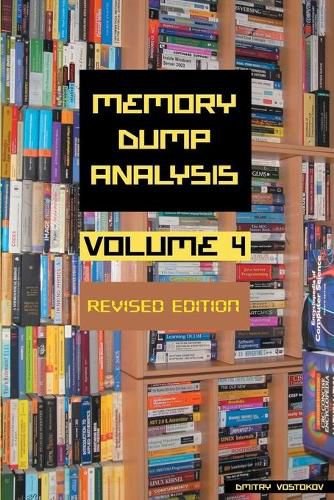Readings Newsletter
Become a Readings Member to make your shopping experience even easier.
Sign in or sign up for free!
You’re not far away from qualifying for FREE standard shipping within Australia
You’ve qualified for FREE standard shipping within Australia
The cart is loading…






This title is printed to order. This book may have been self-published. If so, we cannot guarantee the quality of the content. In the main most books will have gone through the editing process however some may not. We therefore suggest that you be aware of this before ordering this book. If in doubt check either the author or publisher’s details as we are unable to accept any returns unless they are faulty. Please contact us if you have any questions.
This reference volume consists of revised, edited, cross-referenced, and thematically organized articles from Software Diagnostics Institute and Software Diagnostics Library (former Crash Dump Analysis blog) written in July 2009 - January 2010. In addition to various corrections, this major revision updates relevant links and removes obsolete references. Some articles are preserved for historical reasons. Most of the content, especially memory analysis and trace and log analysis pattern languages, is still relevant today and for the foreseeable future. Crash dump analysis pattern names are also corrected to reflect the continued expansion of the catalog.
The fourth volume features:
15 new crash dump analysis patterns;
13 new pattern interaction case studies;
10 new trace analysis patterns;
6 new Debugware patterns and case study;
Workaround patterns;
Updated checklist;
Fully cross-referenced with Volumes 1-3;
Memory visualization tutorials;
Memory space art.
The primary audience for Memory Dump Analysis Anthology reference volumes is: software engineers developing and maintaining products on Windows platforms, technical support, escalation, and site reliability engineers dealing with complex software issues, quality assurance engineers testing software on Windows platforms, security and vulnerability researchers, reverse engineers, malware and memory forensics analysts. Trace and log analysis articles may be of interest to users of other platforms.
$9.00 standard shipping within Australia
FREE standard shipping within Australia for orders over $100.00
Express & International shipping calculated at checkout
This title is printed to order. This book may have been self-published. If so, we cannot guarantee the quality of the content. In the main most books will have gone through the editing process however some may not. We therefore suggest that you be aware of this before ordering this book. If in doubt check either the author or publisher’s details as we are unable to accept any returns unless they are faulty. Please contact us if you have any questions.
This reference volume consists of revised, edited, cross-referenced, and thematically organized articles from Software Diagnostics Institute and Software Diagnostics Library (former Crash Dump Analysis blog) written in July 2009 - January 2010. In addition to various corrections, this major revision updates relevant links and removes obsolete references. Some articles are preserved for historical reasons. Most of the content, especially memory analysis and trace and log analysis pattern languages, is still relevant today and for the foreseeable future. Crash dump analysis pattern names are also corrected to reflect the continued expansion of the catalog.
The fourth volume features:
15 new crash dump analysis patterns;
13 new pattern interaction case studies;
10 new trace analysis patterns;
6 new Debugware patterns and case study;
Workaround patterns;
Updated checklist;
Fully cross-referenced with Volumes 1-3;
Memory visualization tutorials;
Memory space art.
The primary audience for Memory Dump Analysis Anthology reference volumes is: software engineers developing and maintaining products on Windows platforms, technical support, escalation, and site reliability engineers dealing with complex software issues, quality assurance engineers testing software on Windows platforms, security and vulnerability researchers, reverse engineers, malware and memory forensics analysts. Trace and log analysis articles may be of interest to users of other platforms.